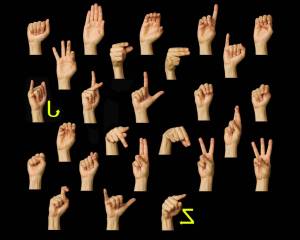The most amazing conversation I ever had was with a woman at a bus stop in Barcelona in October of 2007. I was waiting for either the #43 or the #44 when she showed up. We started chatting as people do while they’re stuck together late at night, and when I turned back to her from a glance down the street, she asked me to repeat myself because she was deaf and hadn’t been able to read my lips.
I was a little surprised because I hadn’t noticed anything in her voice to indicate deafness, but didn’t think much of it. After about 15 minutes, she asked me where I was from and then I was very surprised. I quickly realized something and got so excited that my skin started to tingle because I had unknowingly been looking for this exact woman for two years. In case you missed the Life Changing Moment, it was this: a woman who could only read lips knew I wasn’t raised in Spain, even though she couldn’t hear my voice.
Prior to this, people hadn’t been able to put a finger or a name to what about me was de fuera [from outside; foreign], but there was definitely something and this lady was going to have The Answer.
At this point, she and I are finally on the bus and I ask her how she knew I wasn’t from around there. Sadly, she went with the obvious answer first: “You don’t look like you’re from here.” This statement is patently untrue, as she was looking at my face which is genetically 100% Made in Spain and I was wearing glasses that were “totally Euro” according to a friend of mine.
I asked again, saying that couldn’t be right for the reasons I just cited, and she said that while my diction was perfect (she had no problem reading my lips), my face was somehow ‘other.’ Pressed further, she said that maybe it was something about my cheeks but she couldn’t say what.
And then I knew. I realized that my English-speaking facial muscles were too pronounced and that my face wasn’t making smooth enough movements when connecting different Spanish sounds. This may sound crazy to you, but imagine how English speakers imitate the French, by pursing their lips and stretching the cheeks down and out. This isn’t just a stereotype, it’s the shape your face needs to be to make lots of French sounds. English requires a lot of upper-cheek work (feel your own face when making a long “e” sound like “cheese”).
Deaf thoughts
→ JEOPARDY! knowledge: The football huddle was invented by the Galludet team to prevent their opponent from reading their hand signs. Galludet is the world’s first all-deaf university.
→ ASL (American Sign Language) is not signed English — it has its own grammar and is only called that because it was developed in the States.
→ SWITCHED AT BIRTH, a show with a main character who’s deaf and attends a deaf school, is pretty damn good. I first heard about it in The New Yorker, and am glad I checked it out. The premise is that two girls were switched at the hospital and grew up rich/poor, white/Hispanic, nuclear family/single-mom, hearing/deaf and how they come to grips with what their lives should have been. Last year, they did an episode that was almost entirely devoid of spoken dialogue which was mesmerizing and fascinating.
→ While on the bus with that lady, I told her about an interesting study I’d read about in the Times. Scientists determined that babies were able to distinguish between spoken languages on videos without sound.
→ A Standford student, deaf since birth, describes the process and pitfalls of lip-reading.


June 18, 2013 at 10:23 am
A deaf French woman spoke to me the other day, and she knew I wasn’t French because of the way I was forming the words. Her husband said he couldn’t tell; he thought I was French, but she could because she was lip reading. I think it’s fascinating!
June 18, 2013 at 10:16 pm
I can’t believe this happened to you too! I genuinely cannot believe it! What are the odds?!
(And it’s crazy fascinating. I wonder if there are any deaf researchers in language learning/acquisition. They know stuff we don’t know.)
June 18, 2013 at 11:57 pm
I was looking at post-grad courses, and one was in the pragmatic and sociolinguistic variation of sign language. I felt slightly under-qualified for that, however…
June 19, 2013 at 8:29 pm
Oh, that’s a different thing that I hadn’t considered: variations on SL. Must be like dialects, right?
I meant that having a deaf person study spoken language could tell us a lot about differences in body language, gesturing, facial movements, etc.
June 18, 2013 at 9:43 pm
This fascinates me. I remember being in London once and someone approached me and knew right off the bat that I was American even though he hadn’t heard me talk. He knew because of the way I formed the words. English people don’t open their mouths as widely when they talk, they don’t pronounce the words as distinctly as Americans do. So I can see how people would be able to tell native speakers from non-native speakers of Spanish by the face shapes. It’s so interesting to me, the cues we leave that can observed in different ways.
June 18, 2013 at 10:20 pm
The face muscle difference seems like such a small thing and yet, it could be the most important, though I do think there are other subtle cues….like here where one of the commenters says, “He’s not French! Look at his shoes!” BWAH!
http://www.vice.com/vice/dnd/1283